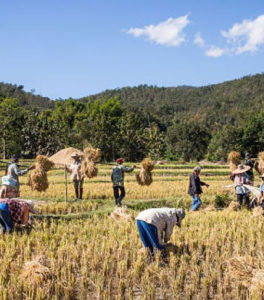UN urges investment in farming to halt rural exodus
Investment in farming and rural economies in developing nations could be an answer to burgeoning levels of internal and international migration, according to a new Unit ed Nations report.
ed Nations report.
The report, entitled ‘2018 The State of Food and Agriculture – Migration, Agriculture and Rural Development’, says that agriculture, the main focus of rural development, receives inadequate resources and attention.
Commissioned by the UN’s Food and Agriculture Organization (FAO), it says modernising agriculture in poor areas could yield significant benefits, raising productivity and providing the pull needed to keep young people on the land instead of migrating to large cities.
The report says jobs in what it calls “agricultural value chains” can provide opportunities for rural people close to where they already live, which is attractive to many who do not want to have to move.
But while international aid donors often target development in poor countries as a way of stemming migration, some forms of development can result in more international migration, as people get enough money to cover their migration costs, but not enough to encourage them to stay.
In contrast, improving agriculture and the infrastructure and services – health, education and social – in rural areas can reduce migration to cities, the report says.
“Rural migration is closely linked not only with agriculture and rural development, but also with the overall development of societies,” the report says.
“It has accompanied the gradual process whereby labour is transferred from agriculture to more productive sectors in manufacturing and services that are often located in urban areas, thus contributing to rising incomes and economic, social and human development,” it says.
“In many high-income countries this process has reached the point where agriculture and rural areas are economically viable only to the extent that immigrant labour is available,” the report says.
Migration within countries far outweighs migration internationally, but the subject receives far less attention.
More than a billion people living in developing countries have moved internally, with 80 per cent moving from a rural area.
Migration between developing countries is also slightly greater than migration from poor to rich nations.
People who have already moved within their own country are also much more likely to become international migrants, the report says.
It says farming can be perilous in developing countries, subject to shocks and crises from natural disasters or manmade problems.
Too little is being done to shield families from these shocks and enable them to survive through lean times, the report says.
Also, rural areas host large numbers of displaced populations during protracted crises, which the report says leads to “further challenges and potentially negative effects”.
It says these situations can be alleviated through policies focusing on providing economic opportunities for displaced migrants and encouraging their social integration.
The report says that policies should not attempt to stop migration, but to maximise its potential and minimise its negative effects.
The report says policies should, have the objective of making migration a choice rather than a necessity.
Laurie Nowell
Senior Journalist












